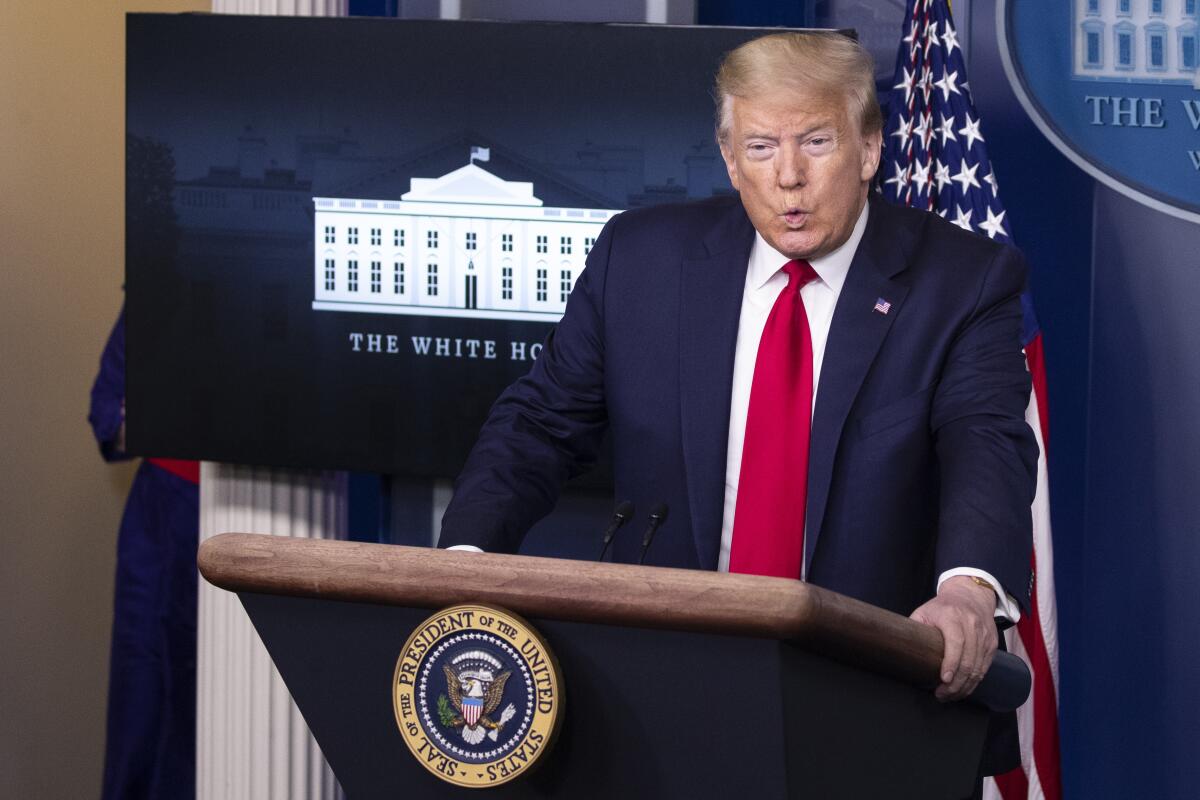Editorial: Trump tries to take a big, dumb bite out of the Twitter hand that feeds him

In a 50-plus-minute press conference on April 22, two doctors who own and operate urgent care centers in California’s Central Valley told a Bakersfield television station that they had analyzed more than 5,000 COVID-19 test results taken at their facilities and concluded, “emphatically,” that it was time to end the region’s stay-at-home orders and let businesses reopen. The effects of sheltering in place, Dr. Dan Erickson said, are “a significantly more detrimental thing to society than a virus that has proven similar in nature to the seasonal flu we have every year.”
A video of their remarks quickly got more than 5 million views on YouTube, reflecting the eagerness many have felt to lift the pandemic-related restrictions. But the pair also drew condemnation and ridicule; the American College of Emergency Physicians and the American Academy of Emergency Medicine, for example, blasted their “reckless and untested musings” as “inconsistent with current science and epidemiology regarding COVID-19.” Added the medical societies, “As owners of local urgent care clinics, it appears these two individuals are releasing biased, non-peer reviewed data to advance their personal financial interests without regard for the public’s health.”
But when YouTube took down the video for violating its guidelines, some critics cited the move as an example of “Big Tech” bias against conservatives. The fact that YouTube isn’t making the doctors’ advice not to stay at home and “develop a weak immune system” available to millions of people is, to these critics, an offense against free speech.
Such complaints have been circulating for several years, ever since YouTube, Facebook, Twitter and other tech giants started trying to weed out misinformation and fake accounts in the wake of Russia’s meddling in the 2016 presidential election. Never mind that foreign meddling has continued and that the companies have proven inefficient and inept (or worse) at scouring fakery and falsehoods from their platforms. To President Trump and like-minded critics on the right, the signal problem posed by Big Tech is the allegedly uneven enforcement of those companies’ rules.
Trump upped the ante Thursday by signing an executive order that threatens to expose online platform operators to more lawsuits if they take “deceptive or pretextual actions” to remove content, even if it violates their terms of service. The order also seeks to have the Federal Communications Commission — the agency that famously ruled in 2018 that it has no authority to regulate the internet — regulate how online platforms enforce their terms of service, while having the Federal Trade Commission investigate whether the companies’ enforcement efforts were unfair and deceptive.
It’s an especially ridiculous overreach coming from a president who supposedly hates regulation. It’s built on anecdotes about bias rather than research. It pretends that the liability shield Congress provided in Section 230 of the Communications Decency Act enabled Big Tech companies to become global behemoths, rather than feckless antitrust enforcement. And it ignores the fact that the tech giants can survive without Section 230, while the upstarts that would compete with them cannot.
The president’s move apparently was triggered by Twitter flagging two of his tweets about mail-in ballots Tuesday as misleading. And let’s be honest, the opinion Trump offered in those tweets about voter fraud was wrapped around a whopper of a falsehood: that Gov. Gavin Newsom was sending ballots to “anyone living in the state, no matter who they are or how they got there” — a not-subtle reference to non-citizens and to migrants living in the country illegally. But that’s not true; ballots will be mailed only to registered voters, as in any state that does universal vote-by-mail. The tweets weren’t flagged because of Trump’s views on voter fraud; they were flagged because of the misinformation he was peddling about California’s policy.
Nevertheless, argued White House Press Secretary Kayleigh McEnany, Twitter demonstrated its bias against Trump by not flagging the disinformation campaigns waged by Chinese officials on Twitter regarding its suppression of religious minorities, the anti-government protests in Hong Kong and the origin of the new coronavirus. But those failures point to a different problem, one shared to varying degrees by every online platform: Far too much bad information is circulating. That’s true in part because the sites’ own algorithms may promote it, and in part because bad actors use the sites to try to manipulate audiences on a vast scale.
Trump hasn’t been a victim of bias; he’s been the prime beneficiary of the platforms’ lax and inconsistent enforcement of their terms of service. It’s richly ironic that the president would want to remove liability protections for the platforms that broadcast the damaging rumors and wild conspiracy theories he spreads about his rivals. Trump’s critics have asked Twitter repeatedly to remove Trump tweets that violated Twitter’s policies, but the company never did. It is now reaping what it sowed.
The problem illustrated by the Bakersfield doctors is that seemingly every issue these days draws a polarized response. Something that should be non-controversial — YouTube deciding not to let doctors use its platform to encourage people to violate orders from county health officials, potentially giving them more patients to treat — gets framed as anti-conservative bias because the blocked content aligned more with Trump’s views than his critics’. We all have complaints about how powerful Big Tech has become and how the various companies do and do not enforce their terms of service. But having the government regulate those decisions won’t make them better. It will only force the companies to bend their policies to the whims of whichever administration happens to be in power.
More to Read
A cure for the common opinion
Get thought-provoking perspectives with our weekly newsletter.
You may occasionally receive promotional content from the Los Angeles Times.






